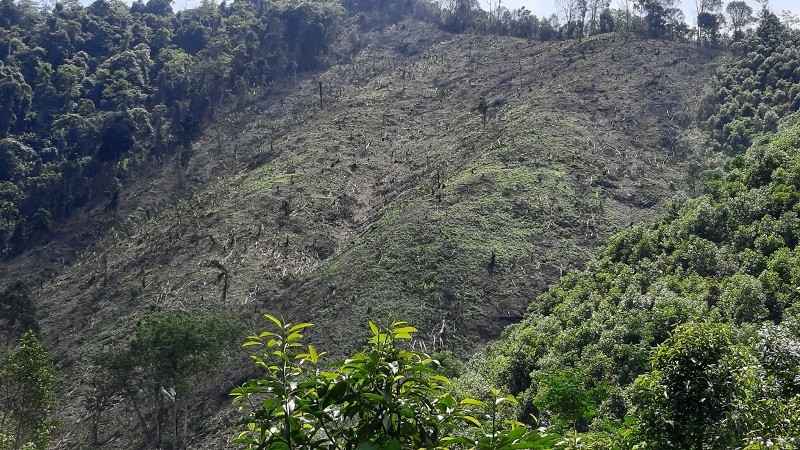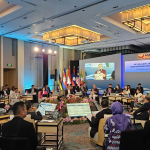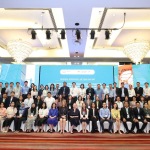Total number of posts 465.
According to new regulations of the European Union (EU), products such as coffee, cocoa, wood and rubber... if originating from deforested and degraded lands after December 31, 2020 will not be exported to this market.
The European Parliament has just passed a bill banning the import of agricultural products whose production processes reduce forest area. This new law aims to limit products related to deforestation being imported into the EU, while encouraging the purchase and sale of legal and non-deforestation items.
Associations and businesses believe that this new regulation will create certain challenges but also an opportunity for Vietnam to increase its market share.

Enhance traceability of wood origin
Talking to Tuoi Tre, Mr. Ngo Si Hoai - vice president and general secretary of the Vietnam Timber and Forest Products Association - said that the association office has informed businesses that the EU regulates products exported to Vietnam. The EU is not involved in causing deforestation and forest degradation after December 31, 2020.
Specifically, all commodity products (including the main products being beef, wood, soybeans, coffee, cocoa) produced on forest land are converted into land to produce agricultural products. This product cannot be imported into the EU after December 31, 2020.
Thus, wood, including interior and exterior products or industrial boards, and other products are also a commodity regulated by this regulation.
According to Mr. Hoai, in the absence of the above new regulations, since 2018 Vietnam and the EU have signed a voluntary partnership agreement to strengthen the enforcement of forestry laws, forest governance and forest product trade (VPA/FLEGT).
In 2021, the Vietnamese Government issued Decree 102 to regulate the Vietnamese timber legality assurance system.
"For wooden products exported to the EU, we think that there will not be much impact because in Vietnam there is currently no conversion of natural forest land. Vietnam has banned the exploitation of natural forests since 2015. 2016 and the Forestry Law also have quite strict regulations.
Therefore, currently there is almost no conversion of forest land, both legal and illegal, to the goal of planting new forests. Maybe here and there, there is a place to convert forest land into construction projects, roads, hydroelectric plants... but there is no conversion of natural forests into planted forests to create products for export to the EU. " - Mr. Hoai said.
However, according to the vice president of the Wood and Forest Products Association, with the new EU regulations, wood industry businesses will have more work to do.
Specifically, businesses must strengthen accountability and must trace the wood materials they use.
"In the last 10 years, Vietnam has strengthened civil law enforcement, especially the conversion of forests to the purposes of growing industrial crops, including commercial forestry, so there are almost no violations. The forestry law is very small, the number of cases is small but the area is also very small.
In the past, the Central Highlands converted poor natural forests to grow rubber, coffee or some industrial crops, the conversion was allowed and legal by the Government.
But in recent years, Vietnamese law has been strictly developed, with no legal conversion. In cases of illegal conversion, there are no wood products exported to the EU" - Mr. Hoai shared.
According to Mr. Hoai, the new EU law wants to use market motivation to push public authorities, people and businesses in countries to be more responsible to contribute to reducing deforestation and forest degradation.
"Although waiting for specific instructions, the association has urged businesses to prepare to adapt, especially preparing to prove the origin of wood taken from land that before December 31, 2020 was a planted forest." - Mr. Hoai said and said that in the future, the association will coordinate with the Ministry of Agriculture and Rural Development to disseminate more deeply to businesses.
Opportunity to add value to coffee
Meanwhile, Mr. Trinh Duc Minh - chairman of the Buon Ma Thuot Coffee Association - said that the new EU law does not have much impact on the coffee industry because it only limits deforestation after December 31, 2020 to grow coffee.
According to Mr. Minh, most coffee in the Central Highlands was grown 20-30 years ago. Therefore, if there is any impact, it will only be affected by procedures to prove origin.
However, the EU side has not yet provided specific information about the proof mechanism, so the Buon Ma Thuot Coffee Association recommends that Vietnam's state management agencies need to soon work with the EU to understand the requirements, procedures and implementation instructions.
Mr. Bach Thanh Tuan, vice president of the Vietnam Coffee - Cocoa Association, also said that with the new EU regulations, the Vietnamese coffee - cocoa industry will not be affected much, "overcoming it easily" and this is a new opportunity for Vietnam's coffee and cocoa industry.
"This new regulation creates challenges for many countries, but for Vietnam this is an opportunity to promote Vietnam's image and production in the context of climate change. If you previously sold coffee products Normally, Vietnam currently sells coffee comes with a carbon emission reduction certificate" - Mr. Tuan said.
Mr. Tuan also stated that in the near future, the Vietnam Coffee - Cocoa Association will coordinate with the Ministry of Agriculture and Rural Development and the EU to access new information and regulations of the EU to create a favorable legal corridor. The Association will work with the Ministry of Agriculture and Rural Development and localities to organize dissemination and information conferences for producers.
"Currently, Vietnamese coffee meets EU requirements, but there is still potential risk if producers do not understand this regulation to avoid future violations. Producers must be responsible to their country." Don't just think about profits" - Mr. Tuan added.
Most of the coffee area exported to the EU meets standards
According to Mr. Le Duc Huy - General Director of 2-9 Dak Lak Coffee Import-Export Company (Simexco Dak Lak), the new European regulation is to prevent the import of goods originating from deforestation from December 31, 2020.
Meanwhile, most of the coffee area in the raw material areas of Simexco in particular and of the Central Highlands and Vietnam in general has been formed for several decades.
Not only that, international certified coffee areas have been established for a long time, farmers are carefully trained on knowledge to ensure quality safety and traceability.
"In general, Vietnamese goods and agricultural products entering the European market are subject to many regulations. Blocking goods originating from deforested land is also one of the strict requirements to ensure traceability at the place of production.
However, for coffee products, the largest export market is still Europe. It is necessary to propagate to people to limit deforestation for farming, and to limit the use of pesticides and chemical fertilizers in plant care," Mr. Huy said.
When to start applying?
Mr. Rui Ludovino - first counselor for policies on climate, environment, employment and social issues of the European Union delegation in Vietnam - said the new law is expected to be announced and applied in May or June 2023 and take effect 18 months later (late 2024 or early 2025). For small and medium-sized enterprises, it will be delayed for another 6 months after this deadline.
According to Mr. Rui Ludovino, Vietnam is implementing the VPA/FLEGT agreement for the wood industry. This regulation has legal and sustainability issues. The VPA/FLEGT Agreement is Vietnam's strength and allows Vietnam to have a forest governance process.
This facility will be used in the process of trading wood and wood products. The wood industry is a typical example for other industries to follow in the near future such as coffee, cocoa, rubber...
"Each industry has certain impacts and influences depending on each country's supply chain inspection system. We must have a tracking system to ensure that products are not involved in the loss of products." forests at all stages of the supply chain" - Mr. Rui Ludovino said and said the EU will issue some guidelines, but countries must also prepare to control in their supply chains.
Vietnam is a country that is not at high risk of deforestation thanks to forest protection policies. But Vietnam needs to further strengthen the supply chain so that Vietnamese agricultural products can penetrate deeper into the EU market.
Don't be subjective
Although European regulations do not have much impact, representatives of export industries still caution businesses not to be subjective to avoid losing markets.
Talking to Tuoi Tre, a representative of a leading pepper export enterprise in Vietnam said that currently Europe accounts for about 18-20% of Vietnam's total annual pepper export volume of 220,000 - 230,000 tons.
Therefore, if this policy is applied, it will be more or less difficult for the export of the pepper industry.
"For about 4-5 years now, there has been no more deforestation to grow pepper. But before 2015, when pepper prices were still good, there were many places that chose to deforest to develop pepper. Therefore, if Europe "follows the past" to apply this regulation, Vietnam will be in trouble. By calculating output, productivity, area..., Europe will have a way to make it difficult for us if businesses are not prepared." This person commented.
Meanwhile, a pepper export business in Binh Duong said that at this time it is not too worrying, but if Europe and many other markets in turn apply this "anti-deforestation" regulation, even applying a new thoroughly for processed pepper products used in food, many Vietnamese agricultural products will face difficulties.
"If a business exporting pho and instant noodles to Europe is required by this market to ensure that the spice package must be imported from areas without deforestation for planting, it will not only be a simple pepper product, but many related products. Other officials were also affected."
Mr. Nguyen Nam Hai, chairman of the Vietnam Coffee and Cocoa Association, said that over the years, Vietnam's coffee area has been stable at 650,000 - 700,000 hectares, and since 2014 the Prime Minister has requested to "close the forest", so Deforestation for new planting is not likely to be much, especially from 2019 onwards.
However, the difficulties for businesses are many if we are subjective. According to Mr. Hai, Europe is taking over the warehouse.
About 45% of the total amount of about 1.6 - 1.7 million tons of Vietnamese coffee exported each year.
Therefore, if tightened, the impact is not small. "It is very necessary to have specific information from Europe, application timelines, specific products subject to application... for businesses to prepare.
If necessary, we should ask Europe to delay the application of this regulation so that businesses can prepare better," Mr. Hai suggested.
Talking to Tuoi Tre, Mr. Nguyen Minh Hoa - vice president of the Vietnam Cashew Association - said that Vietnam's cashew industry is unlikely to be much affected by this regulation because the cashew area has been stable for many years, not growing. Generate new areas from deforestation.
However, according to Mr. Hoa, the worry is that the amount of raw cashews Vietnam imports from Cambodia and Africa is quite large. Therefore, if these countries also encounter "anti-deforestation" regulations, the export of Vietnamese cashew nuts to Europe will be more or less affected.
In addition, according to some businesses, not only cashew nuts but also Vietnamese pepper and coffee are imported from many countries and regions such as Brazil, India, Africa... so it affects the whole industry. Agriculture is quite large.
In particular, with the rubber development policy over the past many years in mountainous provinces, many poor forest areas have been destroyed to grow rubber. Therefore, the most likely difficulty will be rubber products if Europe strictly applies this regulation.
"After Europe, it is possible that the US, Japan, Korea... even China will apply this regulation more strictly. Therefore, to sell goods, Vietnam is required to comply with other countries' regulations, we must act soon and cannot stand aside," said an expert.














